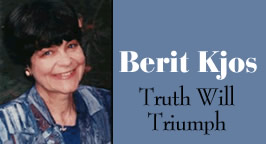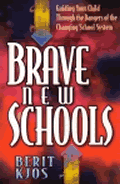Other Kjos Articles:
The UN Plan for Global Migration, Part 1
The UN Plan for Global Migration, Part 2
MARCHING TOWARD GLOBAL SOLIDARITY
By Berit Kjos
July 27, 2006
NewsWithViews.com
"The new generation...[has] a deeper sense of solidarity as people of the planet than any generation before them.... On that rests our hope for our global neighborhood."[1] Report of The UN Commission on Global Governance.
"Welfare depends on the intellectual and moral solidarity of mankind,"[2] Federico Mayor, then Director General of UNESCO
During the 1996 UN Conference on Human Settlements (Habitat II), I attended a day-long "Dialogue" on the meaning of "Solidarity" at Istanbul�s elegant Ciragan Palace. Registered as a reporter, I received a list of 21 panel members. It included UNESCO's Director General Federico Mayor, the now discredited UN leader Maurice Strong, World Bank Vice President Ismail Serageldin, and Millard Fuller who founded Habitat for Humanity. Together with other globalist dignitaries, they would explore the missing factor in the old Soviet version of dialectical materialism: a spiritual foundation for an evolving global ethic.[3]
"To speak of solidarity is to speak of things of the spirit," began Habitat Secretary-General Wally N�Dow. "For we are well aware that the future of our human settlements... is not just a matter of bricks and mortar but equally a question of attitudes and determination to work for the common good.... This spiritual dimension is the only ingredient that can bind societies together."[4]
N'Dow had chosen an American moderator who would add credibility to the discussion: Robert McNeil (of McNeil-Lehrer), "one of the gurus, the spiritual lights of the media industry today."[4] Moments later, McNeil introduced the panel of dignitaries ready to shape the new vision of oneness.
"What�s needed is an interfaith center in every city of the globe," said James Morton, former dean of the Episcopal Cathedral of St. John the Divine. "The new interfaith centers will honor the rituals of every� faith tradition: Islam, Hinduism, Jain, Christian� and provide opportunity for sacred expression needed to bind the people of the planet into a viable, meaningful, and sustainable solidarity."[4]
Dean Morton's version of "Christianity" is actually a universalized distortion of truth that fits easily into the new religious union. Anything less would be dismissed as fundamentalist extremism.
Millard Fuller, President of Habitat for Humanity, fit right into this interfaith dialogue. Like other emerging leaders in the neo-Christian movement, he redefined Scriptures to "prove" his message:
"When Jesus launched His ministry 2000 years ago, He said, 'We must repent for the Kingdom of Heaven is at hand.' In English, that sort of connotes feeling sorry for getting caught. But in the Greek, we read that what He really said was to metamorphose. Metamorphose is what a butterfly becomes when it metamorphoses out of a little fuzzy caterpillar.... Change your whole way of thinking, because the new order of the spirit is confronting and challenging you. ... The only way we will achieve human solidarity in dealing with it is to have a completely new way of thinking."[4]
This "new way of thinking" has already permeated every segment of society: education, business, government, and the church growth movement, including Purpose-Driven churches. Pushing transformation in all these sectors are the leadership training programs that pursue the vision of management gurus such as Peter Drucker, Peter Senge, and Ken Blanchard. The core of their teaching is "general systems theory" or "systems thinking." In short, everything is interconnected, therefore all is One and all divisions and boundaries must be eliminated in order to establish the "Global Neighborhood," i.e. New World Order. Emerging Church leaders like Brian McLaren call it "The Kingdom of God." (This will be covered more thoroughly in Part 2: "SOLIDARITY versus CHRISTIANITY.")
God makes us "one" in Christ when we respond to His gospel with faith and genuine repentance (acknowledging our sin and humbly turning to God). Millard's "new way of thinking" points people to the world's corrupt system, not to God and His ways.
Let�s not forget that familiar words with strategic new meanings are likely to mislead the masses. For example, in Webster's Dictionary (1989) the familiar meaning of solidarity sounds perfectly safe: "common interest and active loyalty within a group." But contemporary change agents have infused that word with a far more revolutionary meaning. Let's take a closer look.
THE NEW SOCIAL CONTRACT
During a break, I asked moderator Robert McNeil to define solidarity for me. In his answer, he acknowledged that solidarity is strengthened by a common enemy as well as a "common good":
"It means people with shared values or responsibilities cooperating or working together. In our culture, it was probably exemplified most often by the union movement. Industrial unions often used the phrase solidarity-- 'solidarity forever.' And in the socialist movement, of course, solidarity was a very strong word -- the solidarity of the workers against the employers, their oppressor, capitalists.... whatever it was...."[4]
"Solidarity is like a social contract, like people agreeing that this is the way it should be. Whether I am poorer or richer than you are, we somehow agree that the way it is set up works best for all of us."
What if we don't agree? Then we are vilified as divisive resisters -- excluded from the feel-good solidarity. Pastor Brian McLaren, an acknowledged leader in the Emerging Church movement, summarized it well:
"...to be truly inclusive, the [earthly] kingdom must exclude exclusive people, to be truly reconciling, the kingdom must not reconcile with those who refuse reconciliation.'"[5]
Social contracts hold people accountable to the new standard. It pushes people toward the planned conformity, whether the society is a church, a school, or the "global neighborhood." So it didn't surprise me to hear UNESCO's Federico Mayor make the same point. "The 21st Century city will be a city of social solidarity," he said. "We have to redefine the words... [and write a new] social contract."[4]
This evolving "social contract" has been written into every UN treaty and declaration. And former President Clinton's Executive Order 1310 helped turn that UN "contract" into US policy. It is being implemented through government policies as well as laws whether the treaties were ratified by Congress or not. [See Trading U.S. Rights for UN Rules]
This "social contract" guarantees "freedom from want," from fear, from hunger, and from offense by those who might voice contrary values. It also promises "freedom of thought and expression" -- but only to those who share the UN vision. Remember, Article 29 of the Universal Declaration of Human Rights states that "...these rights and freedoms may in no case be exercised contrary to the purposes and principles of the United Nations."[6]
Reflecting the same communitarian constraint, Ismail Serageldin, then Vice President of the World Bank, said:
"We should stop bemoaning the growth of cities. It�s going to happen and it�s a good thing, because cities are the vectors of social change and transformation. Let�s just make sure that social change and transformation are going in the right direction.... The media must act as part of the education process that counters individualism."[4]
BEHAVIOR MODIFICATION
A cooperative media is essential to the planned change in public consciousness. As in totalitarian regimes, "voluntary" social transformation relies on effective propaganda. That's why our Education Department's Community Action Toolkit, The President's Council for Sustainable Development, and the UN's Local Agenda 21 all call for partnerships between educators and the news and entertainment media in every community. The public must be persuaded to give its consent; the people must learn to feel so uncomfortable with dissent that contrary voices would be silenced.
The masses must never notice that this manipulative process is changing their minds and actions. Since few people do notice, Professor Raymond Houghton's triumphant promise in a 1970 NEA publication is becoming an alarming reality:
"...absolute behavior control is imminent. ... The critical point of behavior control, in effect, is sneaking up on mankind without his self-conscious realization that a crisis is at hand. Man will never self-consciously know that it has happened."[7]
This plan for "behavior control" would include three essentials steps: (1) a supportive news and entertainment media willing to disseminate politically correct information and inspire values that erode the old boundaries, (2) a management system for measuring and monitoring change, and (3) universal participation in the dialectic (consensus) process.
The latter has become the norm in US schools, corporations, government agencies, and communities. The dialectic process used to control the masses in the former Soviet Union has invaded every corner of U.S. society � even churches. The goal is to involve every human resource (human capital) in the UNESCO program of lifelong learning -- a continual process of training and immersion in the new way of thinking and relating to others.
To succeed, every level of this hierarchical management system (marketed as "local control) must continually assess change, monitor compliance, and remediate the non-compliant.[8]
We shouldn't be surprised. God warned us long ago that the world's ways would lead to corruption and tyranny, not peace and love. His lasting peace is reserved for those who will face the rising hostility with faith and love:
|
Subscribe to the NewsWithViews Daily News Alerts! |
"... in the last days perilous times will come: For men will be lovers of themselves, lovers of money, boasters, proud, blasphemers, disobedient to parents, unthankful, unholy, unloving, unforgiving, slanderers, without self-control, brutal, despisers of good, traitors, headstrong, haughty, lovers of pleasure rather than lovers of God.... And from such people turn away!" 2 Timothy 3:1-13
�These things I have spoken to you, that in Me you may have peace. In the world you will have tribulation; but be of good cheer, I have overcome the world.� John 16:33
Footnotes:
1,
Our Global Neighborhood, "UN Report of The Commission on Global Governance"
(New York: Oxford University Press, 1995); 357.
2,
Forum Discusses Ways
in Which To "Humanize" The City.
3,
Maurice Strong didn't
come to the Dialogue as scheduled.
4,
I taped and transcribed this part of the "Dialogue" at the UN Conference
on Human Settlements in Istanbul, 1996.
5,
Brian McLaren, The Secret Message of Jesus: Uncovering the Truth that
could change everything (Nashville: Thomas Nelson's W Publishing Group,
1006), page 169-170.
6,
Trading
US Rights For UN Rules
7,
Raymond Houghton, To Nurture Humaneness: Commitment for the '70's (The
Association for Supervision and Curriculum Development of the NEA, 1970).
8,
Brainwashing
in America and Moulding
Human Resources For The Global Workforce
Sign Up For Free E-Mail Alerts
E-Mails are used strictly for NWVs alerts, not for sale
Berit Kjos is a widely respected researcher, writer and conference speaker. A frequent guest on national radio and television programs, Kjos has been interviewed on Point of View (Marlin Maddoux), The 700 Club, Bible Answer Man, Beverly LaHaye Live, Crosstalk and Family Radio Network. She has also been a guest on "Talk Back Live" (CNN) and other secular radio and TV networks. Her last two books are A Twist of Faith and Brave New Schools. Kjos Ministries Web Site: http://www.crossroad.to/index.html
During the 1996 UN Conference on Human Settlements (Habitat II), I attended a day-long "Dialogue" on the meaning of "Solidarity" at Istanbul�s elegant Ciragan Palace. Registered as a reporter, I received a list of 21 panel members. It included UNESCO's...











